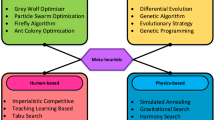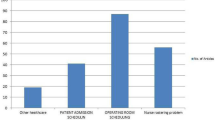Abstract
University course timetabling covers the task of assigning rooms and time periods to courses while ensuring a minimum violation of soft constraints that define the quality of the timetable. These soft constraints can have attributes that make it difficult for mixed-integer programming solvers to find good solutions fast enough to be used in a practical setting. Therefore, metaheuristics have dominated this area despite the fact that mixed-integer programming solvers have improved tremendously over the last decade. This paper presents a matheuristic where the MIP-solver is guided to find good feasible solutions faster. This makes the matheuristic applicable in practical settings, where mixed-integer programming solvers do not perform well. To the best of our knowledge this is the first matheuristic presented for the University Course Timetabling problem. The matheuristic works as a large neighborhood search where the MIP solver is used to explore a part of the solution space in each iteration. The matheuristic uses problem specific knowledge to fix a number of variables and create smaller problems for the solver to work on, and thereby iteratively improves the solution. Thus we are able to solve very large instances and retrieve good solutions within reasonable time limits. The presented framework is easily extendable due to the flexibility of modeling with MIPs; new constraints and objectives can be added without the need to alter the algorithm itself. At the same time, the matheuristic will benefit from future improvements of MIP solvers. The matheuristic is benchmarked on instances from the literature and the 2nd International Timetabling Competition (ITC2007). Our algorithm gives better solutions than running a state-of-the-art MIP solver directly on the model, especially on larger and more constrained instances. Compared to the winner of ITC2007, the matheuristic performs better. However, the most recent state-of-the-art metaheuristics outperform the matheuristic.




Similar content being viewed by others
References
Abdullah, S., Turabieh, H.: On the use of multi neighbourhood structures within a tabu-based memetic approach to university timetabling problems. Inf. Sci. 191, 146–168 (2012)
Avella, P., D’Auria, B., Salerno, S., Vasilev, I.: A computational study of local search algorithms for italian high-school timetabling. J. Heuristics 13, 543–556 (2007)
Bettinelli, A., Cacchiani, V., Roberti, R., Toth, P.: An overview of curriculum-based course timetabling. TOP 23, 313–349 (2015)
Bixby, R.E.: Optimization Stories, 21st International Symposium on Mathematical Programming Berlin, vol Extra, Journal der Deutschen Mathematiker-Vereinigung, chap A Brief History of Linear and Mixed-Integer Programming Computation, pp 107–121 (2012)
Bonutti, A., De Cesco, F., Di Gaspero, L., Schaerf, A.: Benchmarking curriculum-based course timetabling: formulations, data formats, instances, validation, visualization, and results. Ann. Oper. Res. 194(1), 59–70 (2012)
Burke, E., Marecek, J., Parkes, A., Rudová, H.: Uses and abuses of MIP in course timetabling. In: Poster at the Workshop on Mixed Integer Programming, MIP2007, Montréal (2008)
Cacchiani, V., Caprara, A., Roberti, R., Toth, P.: A new lower bound for curriculum-based course timetabling. Comput. Oper. Res. 40(10), 2466–2477 (2013)
Caserta, M., Voss, S.: Metaheuristics: intelligent problem solving. In: Maniezzo, V., Statzle, T., Voss, S. (eds.) Matheuristics, Annals of Information Systems, vol. 10, pp. 1–38. Springer, New York (2010)
Danna, E., Rothberg, E., Le Pape, C.: Exploring relaxation induced neighborhoods to improve MIP solutions. Math. Program. 102(1), 71–90 (2005)
Di Gaspero, L., McCollum, B., Schaerf, A.: The second international timetabling competition (ITC-2007): curriculum-based course timetabling (track 3). Tech. rep., School of Electronics, Electrical Engineering and Computer Science, Queenes University SARC Building, Belfast, United Kingdom (2007)
Fischetti, M., Lodi, A.: Local branching. Math. Program. 98, 23–47 (2003)
Hao, J.K., Benlic, U.: Lower bounds for the ITC-2007 curriculum-based course timetabling problem. Eur. J. Oper. Res. 212(3), 464–472 (2011)
Kiefer, A., Hartl, R., Schnell, A.: Adaptive large neighborhood search for the curriculum-based course timetabling problem. Tech. rep. University of Vienna (2014)
Lach, G., Lübbecke, M.: Curriculum based course timetabling: new solutions to udine benchmark instances. Ann. Oper. Res. 194, 255–272 (2012)
Müller, T.: Itc 2007 solver description: a hybrid approach. Ann. Oper. Res. 172, 429–446 (2009)
Shaw, P.: Using constraint programming and local search methods to solve vehicle routing problems. Principles and Practice of Constraint Programming CP98. Lecture Notes in Computer Science, vol. 1520, pp. 417–431. Springer, Berlin (1998)
Sniedovich, M., Voß, S.: The corridor method: a dynamic programming inspired metaheuristic. Control Cybern. 35(3), 551 (2006)
Taillard, E.D., Voss, S.: Popmusic partial optimization metaheuristic under special intensification conditions. In: Essays and Surveys in Metaheuristics, Operations Research/Computer Science Interfaces Series, vol. 15, Springer US, pp 613–629 (2002)
Vielma, J.P.: Mixed integer linear programming formulation techniques. SIAM Rev. 57(1), 3–57 (2015)
Acknowledgements
The authors would like to thank the organizers of ITC-2007 for providing a formal problem description of CB-CTT as well as benchmark instances. The authors would also like to thank Alex Bonutti, Luca Di Gaspero and Andrea Schaerf for creating and maintaining the website for instances and solutions to CB-CTT.
Author information
Authors and Affiliations
Corresponding author
Rights and permissions
About this article
Cite this article
Lindahl, M., Sørensen, M. & Stidsen, T.R. A fix-and-optimize matheuristic for university timetabling. J Heuristics 24, 645–665 (2018). https://doi.org/10.1007/s10732-018-9371-3
Received:
Revised:
Accepted:
Published:
Issue Date:
DOI: https://doi.org/10.1007/s10732-018-9371-3




